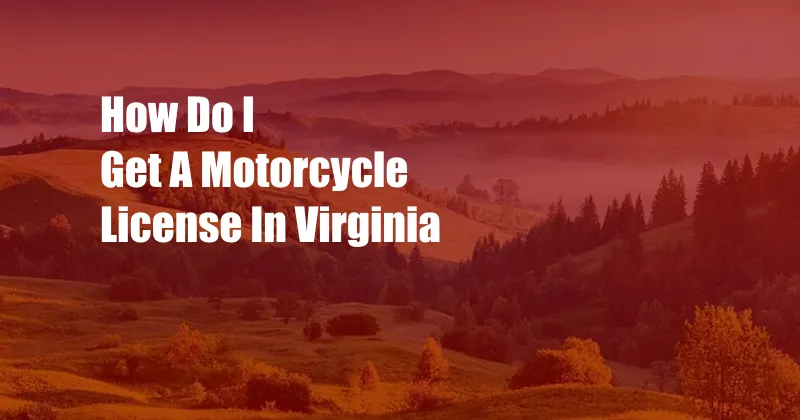
How to Obtain a Motorcycle License in Virginia: A Comprehensive Guide
In the tapestry of life’s adventures, embracing the freedom of the open road on a motorcycle can be an exhilarating experience. If you’re a Virginia resident yearning to conquer the asphalt, acquiring a motorcycle license is an essential milestone. Join us as we navigate the comprehensive process, empowering you to saddle up and ride with confidence.
An Overview of Virginia’s Motorcycle Licensing System
Virginia’s motorcycle licensing system comprises a two-step process: obtaining a learner’s permit and graduating to a full license. The learner’s permit serves as a stepping stone, allowing you to practice your skills under controlled conditions. Once you gain proficiency, you can transition to a full license, unlocking the freedom to ride solo.
Unlocking the Learner’s Permit
-
Meet the Age Requirement: You must be at least 15.5 years old to apply for a learner’s permit.
-
Pass a Knowledge Test: This written test evaluates your understanding of motorcycle safety and Virginia traffic laws.
-
Complete a Motorcycle Safety Course: Enroll in a Motorcycle Safety Foundation (MSF) Basic RiderCourse (BRC) or a Virginia Department of Motor Vehicles (DMV) Rider Education Program (REP). These courses provide hands-on training and invaluable insights into safe riding practices.
Graduating to a Full License
Once you’ve successfully navigated the learner’s permit phase, it’s time to upgrade to a full license.
-
Complete the BRC/REP Training: If you haven’t already, complete a MSF BRC or DMV REP course.
-
Pass a Road Skills Test: Demonstrate your riding skills in a real-world setting, navigating a range of traffic scenarios.
-
Apply for a Motorcycle License: Submit your completed road skills test form to the DMV, along with your learner’s permit, proof of insurance, and the required fees.
Essential Tips and Expert Advice
-
Practice and Seek Feedback: As you practice, seek feedback from experienced riders to refine your skills and improve your safety.
-
Wear Protective Gear: Always wear a helmet, gloves, and other protective gear when riding. This crucial step can minimize injuries in the event of an incident.
-
Ride Within Your Limits: Respect your abilities and ride cautiously, especially in the beginning. Gradually increase your speed and distance as you gain confidence.
-
Stay Alert and Sober: Pay undivided attention to your surroundings while riding. Avoid alcohol or drugs that can impair your judgment and reflexes.
Frequently Asked Questions (FAQs)
Q: Do I need a car license to get a motorcycle license?
A: No, you don’t need a car license. However, it’s beneficial to have experience operating a motor vehicle.
Q: Can I practice riding with my learner’s permit without a licensed rider present?
A: No, you must have a licensed motorcyclist 18 years or older accompany you during practice sessions.
Q: How long does it take to obtain a full motorcycle license?
A: The timeline varies depending on the time it takes to complete the required training and pass the tests. Generally, it can take several months.
Conclusion
Embarking on a motorcycle adventure in Virginia requires navigating the licensing process. By following the steps outlined above, you’ll equip yourself with the knowledge and skills necessary to ride safely and confidently. Embrace the open road, and let the wind guide you towards unforgettable experiences.
Are you ready to embark on a motorcycle journey in Virginia? Share your thoughts and questions in the comments section below.